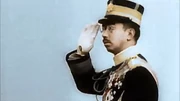Hirohito (29 April 1901 – 7 January 1989), formally known as Emperor Showa, was the Emperor of Japan from 25 December 1926 to 7 January 1989, succeeding Emperor Taisho and preceding Akihito. He led Japan into World War II, but he also led its recovery after the war's end and left Japan in a very wealthy state.
Biography[]
Hirohito was born on 29 April 1901 in Aoyama, Tokyo, Japan to the Yamato dynasty. He was the son of Emperor Taisho and Empress Teimei, and he succeeded his father as emperor on his death on 25 December 1926, inheriting a country plagued with crisis. The Imperial Japanese Army and Imperial Japanese Navy could veto candidates for Prime Minister, and 64 incidents of political violence occurred from 1921 to 1944. On 9 January 1932, Hirohito was nearly assassinated with a hand grenade by Korean nationalist Lee Bong-chang in Tokyo in the Sakuradamon Incident, but he survived. Under Hirohito's rule, Japan's empire expanded, with Manchukuo being created as a puppet state in 1931 following an invasion of China and much of coastal China being occupied in the Second Sino-Japanese War after 1937.
World War II[]

Hirohito saluting worshipping masses
On 27 September 1940, the Tripartite Pact was signed with Nazi Germany and Fascist Italy, bringing Japan into the Axis Powers, with the full support of militarists such as Sadao Araki and Hideki Tojo and to the chagrin of pacifists such as Isoroku Yamamoto and Tomoyuki Yamashita. The hardline Hideki Tojo was the real leader of Japan at the time, using fascism as a model for government and controlling Japan's involvement in World War II against the United States. In 1945, Hirohito made a public broadcast to the people, calling for the surrender of Japan following nuclear bombs being dropped on Hiroshima and Nagasaki by the US Air Force. Because of his lack of control over the war, he was not tried for war crimes, while Tojo was hanged for these atrocities.
Post-WWII rule[]
From 1945 to 1952, the United States had military control of Japan, occupying the islands and replacing the Imperial Japanese Army with the Japan Self-Defense Forces in 1954. Hirohito led Japan into an era of economic success, as the bombing of Japan by the Allied Powers had given Japan room to rebuild its infrastructure and factories. Japan was influenced by western culture, and it became a major economic power despite its military having a limited size. It became the second-largest economy in the world by the end of his reign, and he died in 1989 at the age of 88.
